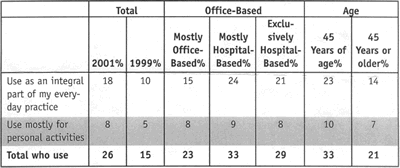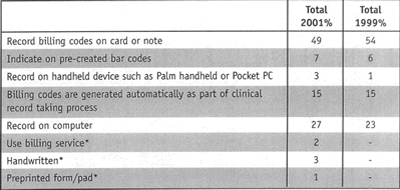 |
|
|
|
Harris Interactive Poll ResultsUsage Higher Among Doctors Who Are Young, Hospital-Based or with Large Practices Aug. 15, 2001 -- Many experts predict that within a few years
most doctors will use handheld computing devices, such as the Palm
handhelds or Pocket PC as an integral part of their everyday practice.
It is expected that they will be used to track and update medical
records for prescribing, and for billing and practice management.
The trend is moving strongly in this direction, according to Harris
Interactive Computing in Physician's Practice, but the pace of change
suggests that a majority of doctors will not do this for several
years. The proportion of all physicians who use handheld personal devices
increased from 15% in 1999 to 26% this year. However, some of these
doctors are using these devices mainly for personal activities.
The number using them as an integral part of their everyday practice
has almost doubled (from 10% in 1999 to 18% this year). TABLE 1 "Please indicate which choice below best describes the degree to which you use each of the following devices or technologies." Base: All Practicing Physicians
TABLE 1 CONTINUED
Currently only a few physicians (3%) use handheld devices to track
their work for billing purposes, but that is up from only 1% in
1999. Just over a quarter (27%) track their work on a computer (not
including those who use handheld devices), a modest increase from
23% in 1999. TABLE 2 "How do you track your clinical work for billing purposes?" Base: All practicing physicians
How soon will more physicians use handheld devices? Many physicians who don't currently use handheld devices to take
notes in their practice are uncertain about when they will start
to use them, but only a minority (29%) does not expect to use them
in the next five years. There is clearly a great deal of uncertainty.
Only 11% of those not using handheld devices expect to start doing
so in the next 18 months. And further, 22% TABLE 3 Expected use of handheld devices to record notes among those currently mainly recording notes via an assistant, handwriting notes and/or dictating notes onto a tape "If you are mainly recording notes via an assistant, handwriting notes and/or dictating notes onto a tape, do you expect to use a handheld device to record notes?" Base: Physicians who mainly record notes manually or dictates onto tape
It is noteworthy that (according to the Harris Interactive surveys
for the Harvard School of Public Health and the Commonwealth Fund)
other English-speaking countries - and probably other European countries
- are ahead of the U.S. in their use of electronic medical records
and electronic prescribing. Of course, it's much easier for countries
with universal health insurance systems
|
|||||
© 2001 PDA cortex.
All Rights Reserved
IT's Cutting Edge




